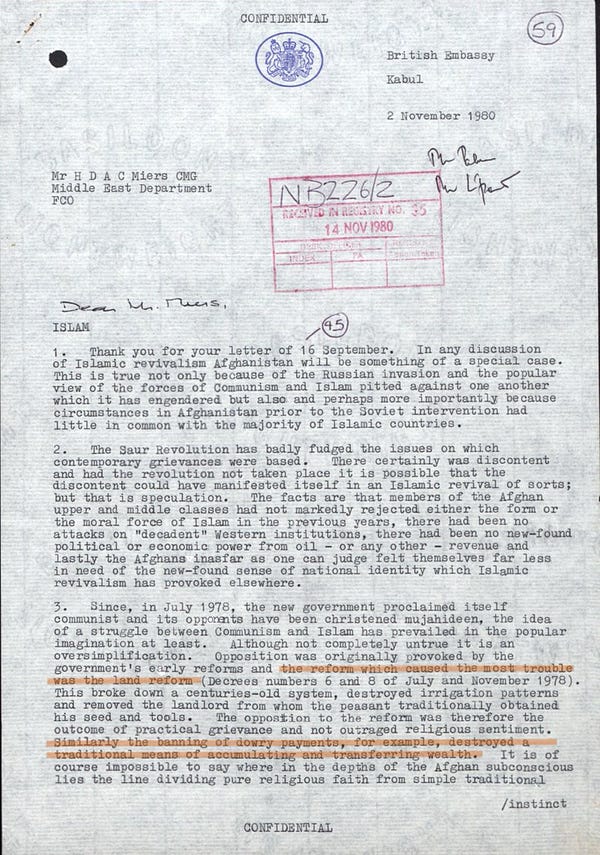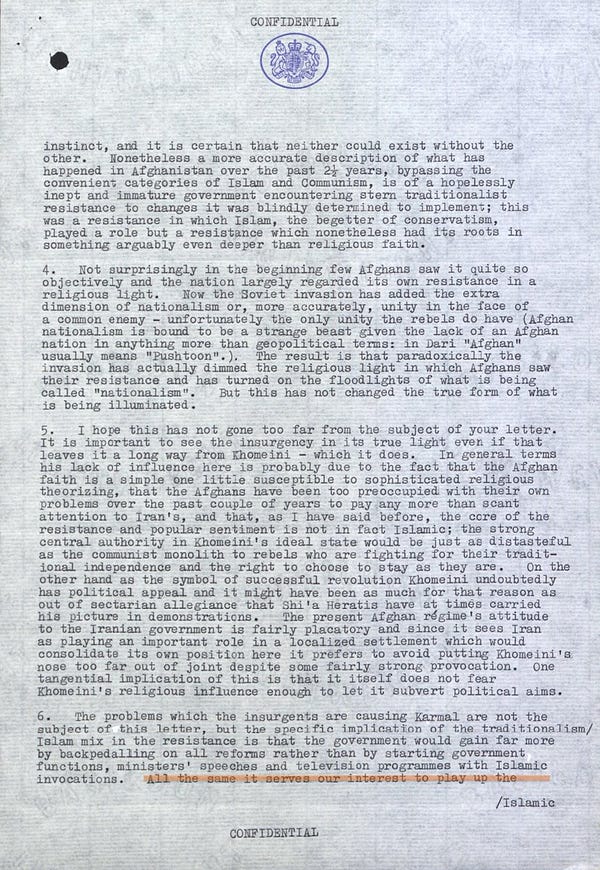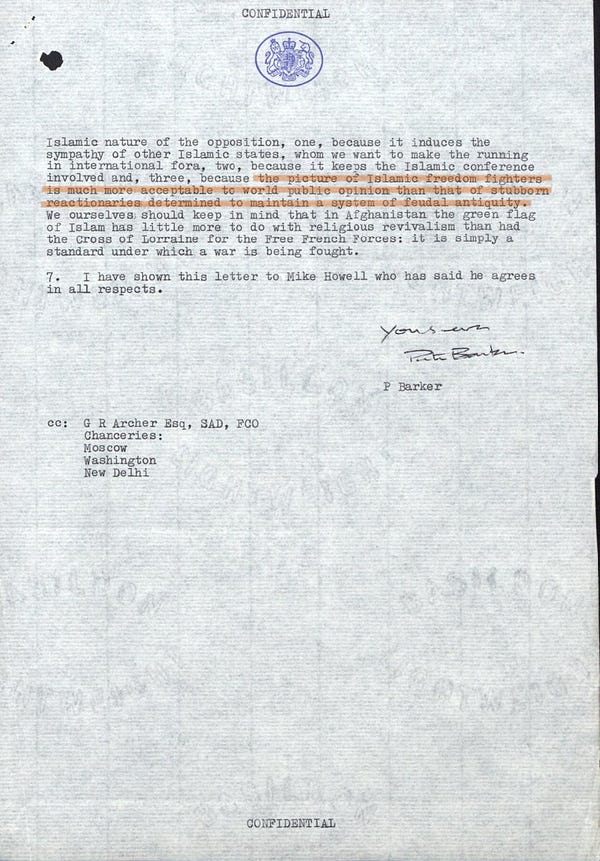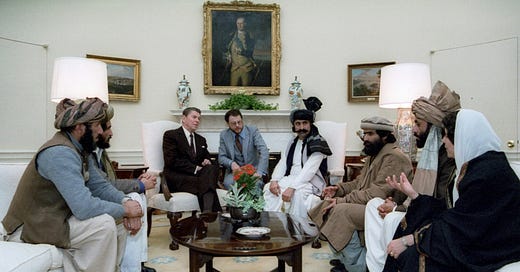Britain admitted US/UK-backed Afghan Mujahideen were 'reactionary feudalists' driven primarily by class, not religion
The far-right Mujahideen the US and Britain supported in Afghanistan were "stubborn reactionaries determined to maintain a system of feudal antiquity" against socialist reforms, the UK embassy wrote.
The British government internally acknowledged back in 1980 that the right-wing insurgents the United States and United Kingdom supported in Afghanistan were “stubborn reactionaries determined to maintain a system of feudal antiquity.”
Moreover, London conceded that these reactionary feudalists were primarily motivated to fight against Afghanistan’s revolutionary socialist government and its Soviet allies not by religion, but rather because the ruling marxists had implemented land reforms and policies to redistribute their inherited wealth.
In other words, the Western-backed proxy war against the USSR in Afghanistan in the 1980s was, like most wars, fundamentally a class war.
But Britain and the US consciously decided to “play up the Islamic nature” of the feudal Mujahideen to disguise their class war on the poor as a religious conflict. And it was this strategy that fueled the fire of sectarianism and gave birth to Islamist extremist groups like al-Qaeda and the Taliban.
We now know this due to the publication of a confidential cable from the British embassy in Kabul, written in November 1980.
The letter was published by British journalist Matt Kennard, one of the best reporters in the world today, who helps run the investigative outlet Declassified UK.




US and UK draw Soviet Union into “Afghan trap”
As early as 1972, the CIA had supported far-right Islamist elements in Afghanistan, encouraging them in their war on Afghan leftists.
Yet despite Washington’s years-long campaign against the Afghan left, communists managed in 1978 to overthrow the military dictatorship of General Mohammed Daoud Khan and institute a socialist government, in an uprising called the Saur Revolution.
In response, the CIA and Britain’s equivalent, MI6, immediately began cultivating right-wing forces to fight the new revolutionary government. They did so with help from Pakistan’s spy agency ISI and the Saudi monarchy.
The guerrilla army of ultra-conservative warlords these foreign powers brought together came to be known as the Mujahideen.
The terrorist violence these Mujahideen carried out against Afghanistan’s revolutionary socialist government forced it to request assistance from the Soviet Union. Moscow militarily intervened in December 1979 to help its ally in Kabul fight the well-funded insurgency.
While the US proxy war against the Soviet Union in Afghanistan is typically associated with Republican President Ronald Reagan, who met with the Mujahideen and sang their praises as “freedom fighters,” the reality is that it started under Democratic President Jimmy Carter.
Carter’s national security advisor, key US imperial planner Zbigniew Brzezinski, later admitted in a 1998 interview that the president had signed the order officially authorizing Operation Cyclone — the CIA program to arm, train, and fund the Mujahideen — back in July 1979, nearly six months before the Soviet Union intervened.
Brzezinski said that, at the time, he knew “this aid was going to induce a Soviet military intervention.” But he insisted it was an “excellent idea,” as it “had the effect of drawing the Russians into the Afghan trap.”
“We now have the opportunity of giving to the USSR its Vietnam war,” Brzezinski gloated to Carter in 1979.
Britain admits Afghan socialist government’s land reforms motivated “feudal” Mujahideen to fight
The United Kingdom joined the United States in waging this proxy war on the Soviet Union in Afghanistan.
British Prime Minister Margaret Thatcher visited a camp of Afghan Mujahideen in a PR stunt in 1981 and declared that “the hearts of the free world are with you.”
While the Iron Lady’s staunchly right-wing administration publicly insisted that the Mujahideen it sponsored were fighting the socialist government in Kabul and its Soviet allies for “freedom,” and while its loyal stenographers in the press maintained that Afghan insurgents were motivated by alleged Russian human rights violations, the British embassy that was actually in the country was quietly admitting otherwise.
The November 1980 UK cable revealed by Matt Kennard noted that, “in the popular imagination," there was "the idea of a struggle between Communism and Islam.” But London conceded that this narrative was “an oversimplification.”
“Opposition was originally provoked by the [Afghan] government's early reforms, and the reform which caused the most trouble was the land reform,” wrote the embassy officer, Peter Barker.
These socialist land reforms “broke down a centuries-old system” of feudalism in Afghanistan, the cable continued, and “removed the landlord from whom the peasant traditionally obtained his seed and tools.”
“The opposition to the reform was therefore the outcome of practical grievance and not outraged religious sentiment,” the diplomat concluded.
And it was not just land reform. “Similarly the banning of dowry payments, for example, destroyed a traditional means of accumulating and transferring wealth,” Barker acknowledged.
That is to say, the leaders of the Mujahideen were feudal landlords who were angry about the socialist Afghan government’s land reforms and policies to break up wealthy families’ inherited wealth.
Barker conceded that the revolutionary “government would gain far more by backpedalling on all reforms rather than by starting government functions, ministers' speeches and television programmes with Islamic invocations.”
Yet even while he recognized that the conflict was the result of an “immature government encountering stern traditionalist resistance to changes,” the British diplomat insisted that London should portray the war in Afghanistan as a religious conflict, intentionally fueling the narrative of Islamist extremists.
“All the same it serves our interest to play up the Islamic nature of the opposition,” Barker wrote, because “the picture of Islamic freedom fighters is much more acceptable to world public opinion than that of stubborn reactionaries determined to maintain a system of feudal antiquity.”
It was precisely this sectarian strategy that gave birth to the Taliban and al-Qaeda.
This British embassy cable shows how Western government officials were well aware of what they were doing in Afghanistan in the 1980s.
Western imperialist powers knowingly supported ultra-conservative feudal landlords in their class war against a socialist government that was intent on implementing land reform and modernizing the country.
They intentionally turned what was fundamentally a class war into a religious war, pouring sectarian fuel onto a massive, nation-wide fire. Why? Because, as London put it bluntly, “it serves our interests.”
Remember this when Western capitals complain about the new Taliban-led government in Afghanistan today. If they don’t like Islamist fundamentalism, they shouldn’t have spent decades fostering it.





